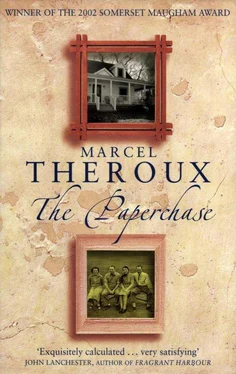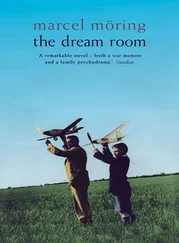‘That’s my opinion, Damien. I majored in Business Administration, not English Literature. In fact, I got an F in Great Books. I can frame a legal document that’s watertight, but if you want literary criticism you should be talking to someone else. That sound funny to you?’
‘You remind me of someone,’ I said, thinking of my father.
‘I’ve lived on Ionia seven years. Fernshaw died before I even came to the island. I’ve never heard that there was anything suspicious in it. I’ll ask my wife if you like, but I’d say you’ve been on your own in that house for too long.’ He smiled at me to show it wasn’t meant unkindly.
‘It’s not my theory,’ I said. ‘I’m sure you’re right. I just wanted to be able to set her mind at rest.’
‘If you really want the scuttlebutt on the Fernshaws, come by and talk to my wife. She’s an authority on island gossip. She’ll tell you what’s true, what’s not true, what might be true, and a whole lot besides.’
I WOULD HAVE GONE to see Mrs Diaz sooner, but I had to go to the mainland to get a new US passport. I had promised Nathan that I would take him with me. He wanted to buy an inflatable boat from a shop in Hyannis. He had called it a turtle boat. I asked him what that was.
‘It’s a boat shaped like a turtle. It’s got feet and a head, and on the bottom it says, “Help”, in case it flips over, so the Coast Guard can come and rescue you.’
‘And what if you don’t need to be rescued?’
He shrugged. ‘You flip it over and get back in.’
My motives for taking him weren’t purely altruistic. I think I hoped to learn something from him that would allay my anxieties about his father. Whenever I was with him now, I found myself checking him over for psychological scars. Aspects of his behaviour which had previously seemed mildly eccentric began to strike me as neurotic.
Nathan was meticulous about his appearance. Whenever the slightest bit of dirt touched him, he broke off whatever he was doing and went to clean himself up — even when he would inevitably get dirty again, minutes later. He spent so much time traipsing across the lawn to wash his hands that I had bought him gloves for outdoor work, which he never took off. Each time I saw him, he was wearing fresh clothes, which was a reproach and an example to me, who tended to wear the same paint-splattered clothes for days. He had a horror of insects and anything rotten: he would go to great lengths to avoid touching decayed apples with his hands, generally spearing them with a stick to propel them into the marshes. Once he shuddered and turned pale after he brushed against some cobwebs in the garage.
Occasionally, I found my mind wandering off in directions that were just plain crazy. At one point, I envisaged a murder scene where Nathan was reluctantly assisting his mother and sister dispose of his father’s body. Perhaps he had contracted his squeamishness from handling his dead father’s severed limbs.
But as soon as I thought about the real Mrs Fernshaw — plump and friendly, moving gracefully around her kitchen — I knew she was incapable of a violent act and felt slightly ashamed of myself. I knew nothing about Mr Fernshaw’s death. My idle brain had daydreamed a set of incidents that had no basis in reality.
At times, I wished I could unread the story. It depressed me. There was something grim and unforgiving about it — the way an intimation of death can make everything else seem foolish or inconsequential beside it. But like an ordinary depression, my anxious thoughts receded altogether sometimes. I had hours without thinking about it when I felt relatively happy. But I only had to remember the vivid and clumsy murder of Abel Mundy and the worries would begin again. As with the first fragment, something in the tone of it was all wrong. The violent murder was as under-explained as Mycroft’s abandonment of Serena Eden.
My speculations weren’t confined to Nathan. I tried to fit his sister’s behaviour into patterns suggested by the story.
I built my obsession on tiny details. The innocuous Michael Winks made better sense as a partner for Terry if you considered that her father had been an ogre. Her insecurity, her eagerness to please her boyfriend seemed to point to a fraught relationship with the dead man. And she hadn’t hesitated about leaving me with Nathan on the day we went to the cinema — I put that down to an abused child’s antennae for a potential abuser.
I know they don’t mean anything — these observations were trivial. You could turn them round and use them to support a contrary argument. But the suspicion remained with me — like one of those obsessive worries which defeat all attempts at reasoning — that it might be based on truth.
*
Winks had hurt his foot and couldn’t drive. He was lying full length on the sofa in the Fernshaws’ TV room with his leg on a pile of cushions. Terry and her mother had gone into town to go shopping, he said.
‘Back-to-school sales?’
‘Yeah. Wish they wouldn’t call them that,’ he said, as he flipped disconsolately between channels. ‘Makes me feel like a prisoner on furlough.’
‘That looks like a bad sprain,’ I said.
‘Tell me about it. The Fernshaws are discovering that stoic fortitude is not my strong suit. Personally, I think these shopping expeditions are just an excuse to get away from me. It’s Nathan’s fault. We were playing wiffleball in the yard. I ran backwards for a pop-up and must have stepped on the side of my foot. Felt like I’d broken it.’
I told him I would be having a cookout before I left. It would have been Patrick’s sixty-fourth birthday in a week. I wanted to mark that and my own imminent departure.
I liked Winks. I wished I could show him the stories: I would have welcomed his thoughts. He might even have been able to ease my worries by pointing out some trivial discrepancy between the fiction and reality. He would have been an ideal reader, but if any part of the story turned out to be true, it would have put him in a difficult position.
Did I think Patrick had killed Mr Fernshaw? It was a literal-minded explanation of the story, I told myself. Equally, that didn’t prevent its being true. But what was truth in this case? I didn’t think that Patrick had ever had a boxing lesson; I was sure Mrs Fernshaw didn’t cook curry and had never been near the Indian subcontinent. I doubted Mr Fernshaw had ever had ‘oakum’ on his boots. Whatever that was.
But what was true was that my uncle was an isolated old man who was troubled by memories of the past. His neighbours were a deaf family, minus one father, who it seemed had been abusive to his wife and children. And these were all spelled out in the story.
It did violence to my memory of my uncle to think that he was capable of such an act, of course. I had never seen him so much as lose his temper, though I knew he was capable of it. I know that when his relationship with my father was at its nadir, my father was physically afraid of him. But this, I thought, was my dad being neurotic. It wasn’t based on a rational assessment of Patrick’s character.
To accept that my uncle would attack someone, hurt someone in a premeditated way, was to accept that I didn’t know him at all. I hadn’t accepted this, but just thinking about it, entertaining the possibility, made Patrick seem stranger and more remote. I wanted to exonerate him, if only so that I could have my image of him restored to its former innocence. Looking back, I suppose I was guilty of a kind of sentimentality.
When Patrick talked about writing, which he didn’t often, because he was superstitious, he sometimes said that a story was a way of asking a question so loosely that the writer wouldn’t even be aware of its real meaning. I think he was afraid of those questions, the ones he couldn’t control, and which couldn’t be answered with any of the vast array of facts that he had stored up in his cranium. I think that’s why he had virtually stopped writing. Better to make lists, better to crack jokes, better to dazzle without any risk of self-exposure. It wasn’t surprising that the stories had stayed on his desk. Mycroft was a dangerous character. He was capable of getting all of us into trouble.
Читать дальше












